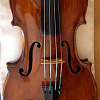We have thousands of human-written stories, discussions, interviews and reviews from today through the past 20+ years. Find them here:

November 2013
V.com weekend vote: Do you prefer a fitted or oblong case?
November 29, 2013 14:06Let's talk about your case: What kind do you prefer?
At this point, I'm simply talking about the shape of your case.
A fitted case can be light, compact and convenient for travel. In fact, I usually take a fitted case on every trip, and fortunately I have one with a music pouch, though it won't fit music that's anything bigger than a sheet of copy paper. I can also manage to fit my shoulder rest in there, though it's pretty close to the scroll of my violin, so I need to put my violin in a bag to protect it.
In day-to-day life, I use an oblong case. Everything fits inside with ease, and it has a nice big music pouch. Still, it's pretty heavy!
What kind of case do you prefer?
Tweet
V.com weekend vote: Are a you a fast-learner, steady learner or late bloomer?
November 15, 2013 09:42Karen Rile's wonderful blog this week about Late Bloomers got me thinking about the various kinds of learning, and where I fit in, where my kids fit in, where my students fit in.
For this weekend vote, I'd like to ask you where you see yourself, starting with three kinds of learners. If you don't see yourself in any of them, please feel free to chime in and talk about the way you learn! Here are the categories:
Fast learner. Here's the learner who has taken in the information before the teacher is even finished saying it. Also, it's the kind of student who can easily adapt their playing after one explanation and then remember it forevermore! The only danger with a fast learner is the potential for boredom, and not wanting to repeat skills.
Slow-steady. This is a person who learns incrementally, a person for whom a setting like school works pretty well. This person might actually enjoy practicing, especially as they see their skills and knowledge building. They thrive on time, dedication and steady work toward a goal.
Plateaus and leaps. This is what Karen described in her blog: someone who is taking it all in, but may not seem to be learning anything at all from the perspective of an outsider. It's the child who, after barely being able to get through an easy reader, suddenly reads an entire Harry Potter book. Or the student who, after lesson upon lesson of barely eking out "La Folia," suddenly turns all heads and plays it with fire and precision at the recital.
Where do you see yourself? And if you don't see yourself, please describe!
Tweet
V.com weekend vote: Are ambitious parents scary, or a wonderful resource?
November 8, 2013 15:07Whether you are a student, or a parent, or a teacher, you undoubtedly will encounter ambitious parents. In fact, they might be your own parents!
But how to view these people in the context of your musical life?
V.com member and writer Karen Rile has been writing a series of blogs aimed at helping parents of music students. Over the last two weeks she's looked at both side of the coin when it comes to ambitious parents: parents as something scary, and parents as your best resource.
We'd all like to take the positive view, and perhaps that should be our aim. But how do you feel at the moment, when you run the tiger parents: scared, or like you are about to have a conversation with someone who will help you greatly?
Tweet
V.com weekend vote: Did you begin your violin or viola studies as a child, or as an adult?
November 1, 2013 09:50
Is it better, easier, faster -- to learn to play the violin or viola as a child, or as an adult?
Well, we can go around and around about this, and I enjoyed V.com member Zlata Brouwer's blog about the topic this week.
A few things to consider: whether you start as a child or an adult, most normal students require a good 5 years before they start sounding "good," and then another five before they begin to be able to play advanced repertoire. Of course, there are exceptions! But as a rule, there are no shortcuts to simply practicing a lot and doing the physical training that is required.
I would argue that your practice means more than your age, when it comes to your success with the violin or viola (or for that matter, the piano, clarinet, etc.) Violinists who are old and young, amateur and professional, get frustrated when the music in their heads does not match what is coming out on the fiddle. After more than 35 years with this instrument, I can say this: don't stop attending to the physical training required by this instrument. You need a lot of patient and correct repetitions to make violin playing work! Frustration usually results from expecting great results from too little practice, or from sloppy or incorrect practice. Slow down, break it down, have patience and do it right. Celebrate the small successes, and they will start adding up, whatever your age!
Tweet
More entries: October 2013











